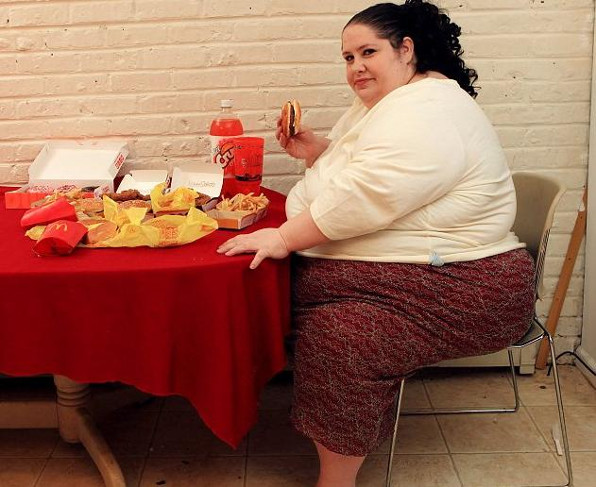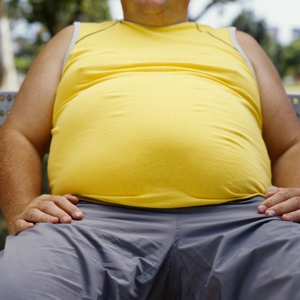Not long ago, I came across a post from a learned institution that talked about how average folks are more circumspect about their shopping and dining choices when they are out with others. But it seems guilt over what witnesses might see is just part of the story…
 Our Poster Girl for Morbid Obesity: Dr. Obvious and I agree she must have kidded
Our Poster Girl for Morbid Obesity: Dr. Obvious and I agree she must have kidded
herself and lied to herself – and ignored the obvious – to the max, to get this way…
Another study report, from researchers at the University of Essex, UK, revealed that virtually everyone there eats a lot more every day than they openly admit – the equivalent of 3 cheeseburgers more, in fact. That’s one-third more than the official daily Calorie consumption recommendations. Yikes! No wonder official estimates predict that 80 percent of al British adults wilt be overweight or outright obese by 2040.
Like the study about what folks order and buy when with others, the Essex study report isn’t about body chemistry or vitamins or the effectiveness of various diet plans. One of the questions the researchers in the Essex study asked was, “Are the fibbers just out to fool everybody else, or are they kidding themselves, too?” The psychology of denial is a morbid, twisted, spider’s web of a thing that hasn’t been fully explained yet. But that’s a psychological (maybe even sociological) issue, not one for nutritionists.
Now, another learned report has surfaced – under Diet and Nutrition – that claims folks believe their eating habits are healthier than they really are.
Why?
“We found that only a small percentage of U.S. adults can accurately assess the healthfulness of their diet, and interestingly, it’s mostly those who perceive their diet as poor who are able to accurately assess their diet,” said Dr. Jessica Thomson, PhD, research epidemiologist with the U.S. Department of Agriculture’s (USDA) Agricultural Research Service in the Southeast Area, the study’s lead author. “Additionally, most adults overrate the quality of their diet, sometimes to a substantial degree.”
Please note: Thomson is not an MD or Dr. of any kind of Science; she’s a PhD.
The objective of the study was to determine, “whether a single, simple question could be used as a screening tool for nutrition studies – to replace or complement the detailed dietary questionnaires commonly used in nutrition research. […] Previous studies have found that self-rated health is a strong predictor of morbidity and mortality, but there is scant research on whether self-rated diet quality is predictive of the actual quality of one’s diet.”
Okay. I’ll admit that’s a pretty heavy academic question. But the findings are pretty simple and straightforward.
What they did
A little more than 9,700 participants were asked to fill out diaries of everything they ate over a 24-hour period. They were also asked to rate the quality of their diets as ‘excellent, very good, good, fair or poor’. Researchers also analysed the dining diaries and calculated a healthiness score for each. Then the fun began.
What they found
“Out of the 9,700 participants, about 8,000 (roughly 85 percent) inaccurately assessed their diet quality. Of those, almost all (99 percent) overrated the healthfulness of their diet. […] Surprisingly, accuracy was highest among those who rated their diet as poor, among whom the researcher’s score matched the participant’s rating 97 percent of the time. The proportion of participants who accurately assessed their diet quality ranged from 1 -18 percent in the other four rating categories.”
“It’s difficult for us to say whether U.S. adults lack an accurate understanding of the components of a healthful versus unhealthful diet, or whether adults perceive the healthfulness of their diet as they wish it to be – that is, higher in quality than it actually is,” Thomson concludes. “Until we have a better understanding of what individuals consider when assessing the healthfulness of their diet, it will be difficult to determine what knowledge and skills are necessary to improve self-assessment or perception of one’s diet quality.”
My take
I wonder if the tiny minority who admitted their diets were poor was representative of the proportion of society as a whole that are realistic about their personal situations. Pitifully few. Or, as the researchers seem to think, were they being ‘honest’ specifically about their eating habits – for some reason?
I think the answer may lie in a simple fact of human nature: The few who were honest and accurate in their own ratings were either resigned to their fate and didn’t care what others might think. Or they realized that, if they accurately reported their dietary intake over the survey period, there was no point in trying to kid themselves or others about its quality. No big mystery there. And that key finding of the USDA study meshes pretty tidily with the findings of the Essex study.
I also think Dr. Thomson is making the whole issue too complicated and mysterious for her and our good.
I suspect that many U.S. adults are, as Thomson says, lacking in their understanding of what’s healthy and what’s not. But I also suspect that the main reason most folks kid themselves (or lie) about their diets is rooted in basic human nature. It’s easier to let things slide, and do what’s pleasant and convenient, than it is to make a real effort to improve their lot. Then they end up dealing with all the ills that overweight and obesity bring. It’s like the closing the proverbial barn door after the horse has fled.
~ Maggie J.

